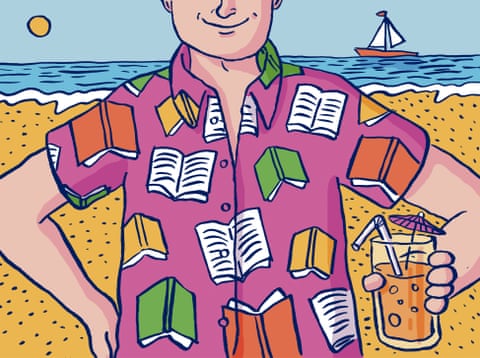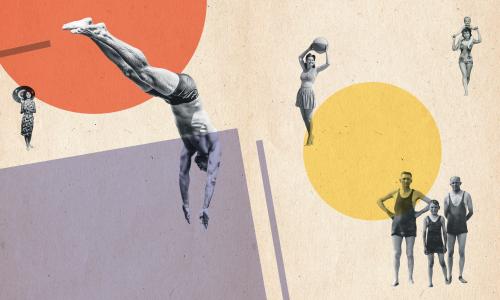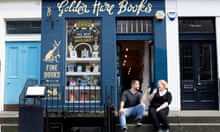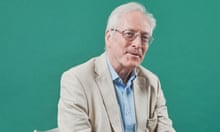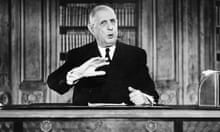Q: I will be travelling alone later this summer for the first time after losing my husband a year ago. I am an avid reader; it’s my therapy. Please could you recommend something inspirational, calming and life-affirming to accompany me into the future? A tall order, I know!
Sarah Sprater, 55, British-born language teacher, Germany
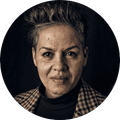
A: Kit de Waal, novelist
If ever there was an affirmation of life, it’s Constellations by Sinéad Gleeson. This beautiful book, part memoir, part essay, covers everything from illness and disability to women’s rights, activism and falling in love. It’s private, it’s public, it’s political, it’s funny and it’s full of hope and determination, the kind you need when you are 28 and lying in a hospital bed with leukaemia. She comes through it, obviously, but with a difference, and that’s what the book is about. It’s something you can nibble at between novels or you can devour it quickly; the effect is the same, and the result is an uplifting account of being given a second chance. For a book that defies convention I would heartily recommend Leonard and Hungry Paul by Rónán Hession. It’s as simple as it is unique, the story of two young men living ordinary lives in an unnamed town, happy and for the most part fulfilled. One writes children’s encyclopedias, the other works part time doing not very much. What makes it work? It is a celebration of kindness and having enough and being content – and living a life devoid of high drama and conflict. It’s very funny, and well-written, poetic in places. But above all it’s kind, a celebration of often overlooked people. Helen With the High Hand by Arnold Bennett is a forgotten classic, a light, comedic novella about what happens when Helen moves in with her miserly, estranged, elderly uncle and the ensuing battle of wills. Who runs the house? Where does the salt cellar sit? What time is bedtime? It’s a wry, understated tale set in Stoke-on-Trent in 1910. Everything about it is old-fashioned, indeed Bennett was criticised by the Bloomsbury set even in his lifetime for his traditional attitudes. But this little domestic tale is full of tender heart, humour and wisdom. And it’s very short. For all literary questions when we find ourselves at life’s crossroads, I would recommend The Novel Cure by Ella Berthoud and Susan Elderkin. In this mini-reference book for all life’s conditions, from apathy, through to first love, loneliness and “zestlessness”, the authors recommend novel cures, books that speak to your ailment, that can help you navigate your situation and come out wiser (and better read) on the other side. It’s a great present. Buy it for yourself.
Kit de Waal’s novels include My Name Is Leon and The Trick to Time (Penguin). She also edited Common People, a recent collection of essays, poems and memoir (Unbound)
Q: I am looking for the perfect political thriller or crime novel for my summer reading. Preferably a book with links to global politics and international relations and even better if it had a feminist twist.
Sini Maria, London

A: Jonathan Freedland, Guardian columnist and thriller writer
Modesty prevents me from suggesting To Kill the Truth by my alter ego, Sam Bourne, as the answer to your prayers – even though it ticks those boxes, with a female protagonist, former White House operative Maggie Costello, tackling a global conspiracy. Meanwhile, Tom Bradby’s Secret Service administers a strong dose of international politics with an all-too-plausible premise, and Mick Herron’s splendid creation, the MI5 rejects of Slough House led by the repellently brilliant Jackson Lamb, return in Joe Country. A Fatal Game by Nicholas Searle is a spy thriller with extra authority: the author served in British intelligence for more than 25 years. Not political exactly, but Denise Mina’s Conviction offers a dark twist on the true crime podcast, while JP Delaney’s The Perfect Wife, out in early August, promises first-rate psychological suspense.
Jonathan Freedland’s Sam Bourne series is published by Quercus
Q: I enjoy reading real-life stories of inspirational women, such as Michelle Obama’s Becoming and The Glass Castle by Jeannette Walls, and am looking for a new one for this summer. Last year’s holiday read to beat was Educated by Tara Westover.
Saskia Volders, 44, career coach, Swansea

A: Cathy Newman, presenter of Channel 4 News
There are so many stories by wonderfully inspirational women, the only difficulty is narrowing down the selection. So how about Why Be Happy When You Could Be Normal? by Jeanette Winterson, the heartbreaking but at times hilarious life story of the author of Oranges Are Not the Only Fruit? Or, less well known: Hackney Child by Hope Daniels and Morag Livingstone. Hope walked into Stoke Newington police station with her brothers and asked to be taken into care. Both her parents were alcoholics; her mum a prostitute, and this is the tale of her escape. In a similar vein is Andrea Ashworth’s Once in a House on Fire, in which Andrea finds refuge from a violent stepfather in works of literature. As in Winterson’s memoir, amid the horror there is humour – and, from this reader at least, massive respect for the author’s achievements in overcoming adversity. Personal History by Katharine Graham is also about huge achievement, albeit from a position of privilege. The Washington Post publisher’s 1997 autobiography provides a fascinating insight into how she ruled the roost in a man’s world. And finally Slay in Your Lane: The Black Girl Bible by Yomi Adegoke and Elizabeth Uviebinené. There are many self-help manuals by white women. This one is by two black women – and it’s the business!
Cathy Newman is the author of Bloody Brilliant Women: the Pioneers, Revolutionaries and Geniuses Your History Teacher Forgot to Mention (William Collins)
Q: I often find myself returning from holiday with the big book I took with me unread. Unfinished classics litter my book shelves, which makes me feel guilty. Can you suggest some shorter novels or collections of short stories that might suit this year?
Lachlan Fotheringham, psychiatry trainee, 29, Newcastle

A: Mark Haddon, novelist
It is possible to tick off a few literary classics without devoting six months of spare time to each one. My list of suggestions would include Seamus Heaney’s 144-page translation of Beowulf (the audiobook, which Heaney reads himself, is the only one I have ever finished then immediately restarted) and Father and Son by Edmund Gosse – just over 300 pages – which is an account of growing up as an only child in a Plymouth Brethren household in the mid-19th century with a mother who died early and a zoologist father who rejected the heretical ideas of Charles Darwin. There have since been a number of autobiographies by writers brought up in stern, evangelical families but this warm, acute, funny, sad book remains, I think, the best. Jacob’s Room by Virginia Woolf was published in 1922, the same year as Ulysses and The Wasteland. It doesn’t flaunt its cleverness but is as rich and deep and wise as either and is around the 300-page mark. My copy has more excited biro underlining than any other book I own. Meanwhile, Robert Musil’s The Man Without Qualities (well over 1,000 pages) is a book to be read while in traction after a serious leg-break.
Mark Haddon’s latest novel is Porpoise (Chatto)
Q: Is War and Peace a book for a vacation? If not, what is the best classic for a summer read?
Anonymous, Cheshire

A: Robert McCrum, writer
I favour a holiday book that’s neither a chore nor a burden, and I worry that War and Peace (especially in the wrong translation) might be both, and end up, like the worst of good intentions, a half-explored, semi-digested, reproach. Besides, Tolstoy’s short fiction, especially his masterpiece, The Death of Ivan Ilyich, for instance, is just as brilliant. For another classic short novel you might finish before take-off, but can savour and reread in the sunshine with a glass of white wine, I’d sneak a copy of Muriel Spark’s The Prime of Miss Jean Brodie into my back pocket. Alternative safe bets: The Code of the Woosters (PG Wodehouse); The Great Gatsby (F Scott Fitzgerald); and Emma (Jane Austen). Wild cards: Moby-Dick (Herman Melville); Hadrian the Seventh (Frederick Rolfe); Three Men in a Boat (Jerome K Jerome). And topical nonfiction: The Right Stuff (Tom Wolfe).
Robert McCrum was the Observer’s literary editor; his most recent book is Every Third Thought: On Life, Death and the Endgame (Picador)
Q: Can you recommend a few books for a cheap and cheerful weekend getaway with the girls in London? We can’t afford to go abroad.
Anonymous lawyer, 29, West Yorkshire

A: Emma Jane Unsworth, novelist
Strip off and dive into In at the Deep End by Kate Davies. As refreshing as an outdoor pool in 40-degree heat, this is the brazen and hilarious tale of one woman’s lesbian sexual awakening in the city you’ll be in. Also set in London, Our Stop by Laura Jane Williams offers another dose of smart, sisterly storytelling. With male characters as complex as female ones, and the patriarchal narrative given a healthy throttling, you can practically feel modern romance evolving as you’re reading it. If escapism is more your bag, My House in Umbria by William Trevor is a stunningly beautiful novella about a romantic novelist with a tragic past. Languid, lush and poignant, it will transport you to central Italy and restore your faith in humanity, which is more than can be said for most airports. Finally, time for a wild ride through Los Angeles. Strap in for Postcards from the Edge, Carrie Fisher’s semi-autobiographical novel about rehab, Hollywood, and mother-daughter rivalry. It’s a masterclass in voice, and a book with all the thrills and spills of a 747. There. Forget flights. Buy books.
Animals, a film version of Emma Jane Unsworth’s 2014 novel of the same name, is in UK cinemas in August. Her next novel, Adults (Borough Press), will be published in February
Q: My son is 11. We are going on a campervan holiday to Slovenia that will involve a lot of driving time and therefore a lot of books. He likes to read series. He’s read Percy Jackson, everything by Anthony Horowitz and all the other obvious ones. And while he might be keen, I think he might be a bit young for dystopian YA . Any suggestions?
Ruth Johnson, researcher, 48 Manchester

A: Patrice Lawrence, YA author
If your son likes series (and Percy Jackson), start with Maz Evans’s series Who Let the Gods Out? Human boy Elliot and zodiac goddess Virgo battle a tricksy death daemon, helped by various Olympians. It hits that enviable sweet spot making adults and children laugh out loud. I’ve always loved crime books and in Sharna Jackson’s High Rise Mystery, sisters Nik and Norva investigate the murder of their art teacher, Hugh, on a south London estate. There’s more to come from them. Another first-in-a-series and very funny is Planet Omar: Accidental Trouble Magnet by Zanib Mian, inspired by Wimpy Kid and Tom Gates. It contains a bully, a dragon and a little brother who screams like a siren. Finally, a standalone. Sita Brahmachari’s Where The River Runs Gold, a compelling read about siblings seeking the truth in an alternative, ecologically challenged world, where food is controlled by one shady organisation. Close to but not quite dystopian YA.
Patrice Lawrence is the author of Orangeboy and Indigo Donut (Hodder Children’s Books), and other YA books
Q: I’m feeling overwhelmed by all the constant hard-hitting news. Can you recommend me a really engrossing, sweeping, escapist read for my summer break?
Laura, 30, Wales

A: Julie Myerson, novelist
I hesitate to call it escapist – it’s satire of the most bitingly enjoyable kind – but if you want a big, fat, darkly funny read, which keeps you guessing until its bitter and startling end, look no further than Mark Lawson’s (to my mind, underrated) page-turner The Deaths. Similarly, Sarah Waters’s astounding Fingersmith is one of those novels that convinces, grips and twists you in its silken clutches. And if you love that, try Wilkie Collins’s The Woman in White, written a century and a half earlier and no less urgent and captivating. A tiny jewel of a novel, but sweeping in its power and scope, is Carys Davies’s West, an unforgettably epic tale of settlers and monsters. Finally, the last time that, sunk so deep in a novel, I almost forgot to eat, sleep, breathe, was with Somerset Maugham’s 1915 masterpiece Of Human Bondage. Emotionally daring, constantly real and ultimately deeply moving, it’s hard to believe this wasn’t written yesterday. I envy anyone who has yet to read it.
Julie Myerson’s latest novel is The Stopped Heart (Vintage)
Q: What can I read to immerse myself (metaphorically) in Lake Como?
Fiona Salt, 43, English teacher, Lancashire
Q: Can you suggest novels set in Italy, particularly Milan, Turin, the lakes, Genoa or the Riviera?
Anne Gray, 60, retired, London

A: Tobias Jones, writer
Alessandro Manzoni’s The Betrothed is considered the great Italian novel: set around Lake Como, Monza and Milan, it tells the story of an engaged couple whose wedding plans are thwarted by the dastardly Don Rodrigo. The book reads like a cross between Dumas, Walter Scott and Horace Walpole: it’s racy, gothic melodrama set in 1628-30, with young love obstructed by the politicking of foreign oppressors, priests, aristocrats and lawyers. Stendhal’s The Charterhouse of Parma is tighter and cooler: set between Lake Como and Parma, it’s both a love story and a portrait of the astonishing cynicism of court life. If you prefer noir to historical fiction, Giancarlo De Cataldo, Gianrico Carofiglio and Maurizio De Giovanni are contemporary novelists who offer realistic glimpses into the Italian underworld. Sometimes you get both genres combined: Alberto Moravia’s The Conformist, Natalia Ginzburg’s The Things We Used to Say and Giorgio Bassani’s The Garden of the Finzi-Continis show the consequences of extremism on the personal and vice versa. The elegiac lightness of the latter two makes the grotesque shadow of fascism seem somehow less domineering.
Tobias Jones writes fiction and nonfiction and lives in Italy. His latest book is A Place of Refuge: An Experiment in Communal Living (Quercus)
Q: Which Shakespeare do you recommend for summer 2019?
Carry Schneider, 50, English and drama teacher, Germany

A: Emma Smith, professor of Shakespeare studies, Oxford University
This depends on whether you want to embrace, interrogate, or deny the chaos around us. Brexistentialists might masochistically enjoy Timon of Athens, a satiric fable about the collapse of financial and social bonds. For escapists, The Merry Wives of Windsor shows mature women asserting their automony, set in a provincial town that has managed to retain its comic French physician, Dr Caius, despite the nationwide exodus of EU medical professionals. And if you hope that Shakespeare might have an answer, try the late play Cymbeline. Britain decides to withhold monies payable to a shadowy European power, and goes to war to protect its sovereignty. Despite winning, they agree to pay up, and to fly the Roman and British flags together over London. If that all sounds a bit pie-in-the-sky, this is a play founded on wonderful impossibilities. But actor Harriet Walter described how for the play’s heroine, Innogen, “the will to believe makes you keep going, even though all the time events are against you”. Wise words this summer.
Emma Smith is the author of several books about Shakespeare, including This Is Shakespeare (Pelican)
Q: What Greek or Roman classics to read in the summer?
Anonymous student, Sussex

A: Natalie Haynes, writer
Sappho wrote thousands of lines of lyric poetry, almost all of which are lost, but we do have three relatively complete poems and multiple fragments of varying lengths. Anne Carson’s If Not, Winter: Fragments of Sappho presents the Greek on parallel pages to her excellent, elegant translations. It is dazzling to see how much beauty can be found in even the smallest scraps of verse. I have been thinking about collective madness recently: what makes a crowd suddenly adopt the same delusion? Euripides’ The Bacchae asks this question (and many others). As so often, the Penguin classic (translated by Philip Vellacott) is excellent. Virgil’s The Aeneid has held me in its grip since I read Book 2 for GCSE Latin. The Trojan horse, the fall of the city, sea snakes: it has it all. Book 4 is Dido and Aeneas, one of the greatest love stories. Robert Fagles’s translation is pretty good (but can we persuade Emily Wilson, the amazing translator of Homer’s Odyssey, to do this next?).
Natalie Haynes is an author, critic, broadcaster and classicist. Her latest book, A Thousand Ships (Mantle), is a retelling of the Trojan war from an all-female perspective
Q: Can you recommend any nonfiction books tackling race-related issues? I would love to keep informed while still enjoying summer prose.
Anonymous student, 18, Manila, Philippines

A: Johny Pitts, writer and broadcaster
It’s a hot summer, so I’m going to suggest some cool and nuanced analysis. Race is a construct, and Robin DiAngelo’s White Fragility is a refreshing look at how a white “race” that often operates from a normalised non-racialised position has been used to create a racial hierarchy and, crucially, how it might be deconstructed. Angela Saini’s Superior: The Return of Race Science eloquently explores the vehicle through which such racist logic has and is once again being pushed. There have been some important rereleases of timeless anti-racist classics recently. Frantz Fanon’s Black Skin, White Masks shows whiteness in action through the system of colonialism, and the damage done to the psychology of its colonised subjects. And a new generation of thinkers are arming themselves with Audre Lorde’s endlessly quotable Sister Outsider, counteracting racism with an intersectional approach, at the crossroads of race, gender, and sexuality.
Johny Pitts’s Afropean: Notes from Black Europe (Allen Lane) was published in May
Q: What should I read on a wet camping holiday in Scotland? I am fond of the coming-of-age genre and need something to cheer me up after reading Stoner by John Williams
Holly, 32, student, Manchester

A: Anthony Quinn, novelist
Camping, eh? Your hardy nature might appreciate Kidnapped, RL Stevenson’s magnificent tale of David Balfour’s coming of age and adventures as a fugitive in the Highlands. His volatile friendship with the Jacobite Alan Breck is immortal, and their reconciliation scene after a bust-up had me sobbing my heart out. You can also use the book to flap away the midges. In The Ghost Writer, Philip Roth introduced his alter ego Nathan Zuckerman as a 23-year-old, seeking out his reclusive hero in rural Massachusetts. It’s a brilliant and unsettling story of a young writer finding his voice. As the ultimate battle for a soul, Edmund Gosse’s Father and Son is a must - one of the funniest, and saddest, memoirs ever written. Bonjour Tristesse made its author, Françoise Sagan, an overnight sensation in 1954 and fixed her spoilt teenage narrator Cecile permanently in the minds of readers. On getting home (hooray!) you can watch Otto Preminger’s superb movie of it starring Jean Seberg and Deborah Kerr. I hope it’s not too wet up in Scotland, Holly, and that these books will see off your post-Stoner blues.
Anthony Quinn’s novels include Freya and Our Friends in Berlin (Vintage)
Q: I am going on a trip through Russia, Estonia, Latvia and Poland – what books would you recommend (particularly with some Soviet history, but not necessarily nonfiction)?
Hannah Fergusson, 21, law student, Edinburgh

A: Luke Harding, journalist and writer
I’m a great fan of the Finnish-Estonian writer Sofia Oksanen. She’s a publishing sensation (2m books sold) whose subject matter – the Soviet occupation of the Baltics – might seem a little daunting. In fact, her novels Purge and When the Doves Disappeared are brilliantly readable and very sharp. Oksanen writes about the divergent fates of collaborators and resisters and Estonian rural life: pancakes, sugar beet soup and jam-making. Her villains go from Vladivostok sex traffickers to secret policemen. Vasily Grossman’s Stalingrad is just out in English and can now be read with his follow-on masterpiece Life and Fate. The two books show the Soviet Union under German attack. There are soldiers and commissars; nuclear scientists and miners; kolkhoz workers and women medics. Grossman gives voice to the millions lost in the “harsh whirlwind” – with love affairs, family rows and chilling close-ups of Hitler and Stalin. Both books are big. You will need a rucksack. Slender, and more playful, is Imperium by Polish journalist Ryzyard Kapuściński. Kapuściński stirs debate. Are his works factual accounts or magical interpretations? Nonfiction or not quite, it is a riveting chronicle of the dying days of the USSR and its collapse into a kaleidoscope of new states and rivalries. It is wonderful, luminous, and questing: the work of a genius-reporter at the height of his power.
Luke Harding is a Guardian foreign correspondent who was based in Russia from 2007 to 2011. His books include Collusion: How Russia Helped Trump Win the White House
Q: I’m travelling to southern Tuscany for my honeymoon in August. We will be staying at a very quiet place in a little hill town with hammocks and long views. There will be lots of time to read. I like reading pacey, character-led novels but I don’t want to burst the honeymoon bubble with one that is dark, violent or too sad. I have The Enchanted April and The Leopard on my shortlist but want more. Please advise!
Anonymous social sciences academic, south-east London

A: Bernardine Evaristo, novelist
Because you already have two books based in Italy I’ve selected novels set in tropical climates for you to enjoy while you’re basking in the Tuscan sunshine; all are fast-moving and character-driven. Song, a powerful debut by Michelle Jana Chan is the beautifully described story of an impoverished Chinese boy who sails to Guyana and rises, against all odds, to lead an exceptional life. De Rightest Place by Barbara Jenkins is another recent debut Caribbean novel, about a woman managing a bar in Trinidad with a host of extraordinary characters passing through. The writing is exciting and the storyline totally original. The Secret Lives of Baba Segi’s Wives by Lola Shoneyin is a subversive take on polygamy in Nigeria. It centres on a domestic despot who has no idea what his four wives are getting up to as they cunningly plot to survive marriage to him. Moving over to Uganda, Maggie Gee’s My Driver is an amusing and insightful take on power relations between a Ugandan cleaner and her former London boss. Both women starred in its equally funny prequel, My Cleaner.
Bernardine Evaristo is a novelist, poet, critic, dramatist and essayist. Her most recent novel is, Girl, Woman, Other (Hamish Hamilton)
